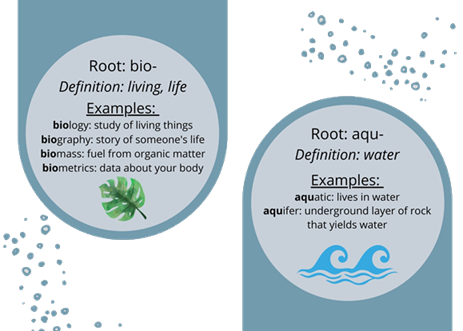Module 1 Section 2
Vocabulary: Understanding Greek and Latin Roots
When studying science and biology, you learn how various forces impact the world around us. What seems like chaos on the surface is controlled, albeit by forces beyond what we can see. A force put into motion will continue until the conditions that started it no longer exist. Even though natural forces are chaotic and unpredictable, they still follow certain rules or “laws.”
In the same way as there is order within the natural world, language has its own rules and “forces” that guide its use. Many world languages have roots that go back thousands of years to ancient Greece and Rome. While you may not be able to speak twenty different languages, you can learn to identify root words that can help you decode new or unusual vocabulary you encounter while reading.
Learning to decode root words is like having a key that opens any treasure chest. It gives you an instant understanding of a word, even if you have never seen it before. Let’s look at a few examples of Greek root words you may already know!
Just as roots “feed” the heart of a tree, the root of a word is the center of its meaning. In these examples, you see the roots bio- and aqu-. Once you learn to identify roots and their specific meaning, you can decode any word. If you came across the word “aquatic” while reading a book about plants and you knew that the root word “aqu” means something connected to water, you could draw a conclusion that “aquatic plants” are plants that live in or around water.


